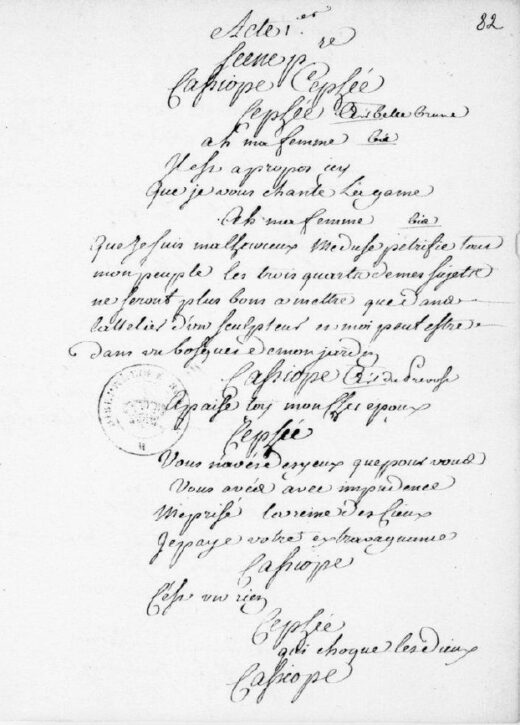
Manuscript
25 pages
Author(s)
Polichinelle Persée
This manuscript is kept in the Soleinne collection of the Bibliothèque nationale de France (French national library, Ms FR 9313). Although anonymous, the similarities of the play with the prologue of Polichinelle censeur des théâtres (Polichinelle critic of the theatres) suggest that it was also written by Denis Carolet. Polichinelle Persée is a parody of Persée (Perseus), a tragedy by Quinault, set to music by Lully (1682) and which had just been performed again at the Opéra (Paris Opera); Carolet had already parodied this play in Mariage en l’air (literally, Marriage in the air), put on at the Opéra-Comique on March 13, 1737. The comic of this version for puppets originates in the informal speech of the dialogues, as well as in the role distribution, which assigns a dual identity to the characters: Polichinelle plays Persée (Perseus), Pierrot plays the king Céphée (Cepheus), Scaramouche is Phinée (Phineus), Céphée’s brother to whom Andromède (Andromeda) was promised, and Mère Gigogne plays the queen Cassiope (Cassiopeia). It seems that the other characters, most particularly Andromède, Mercure (Mercury) and Méduse (Medusa), did not have a dual identity.
The performance was preceded by a prologue: Polichinelle censeur des théâtres.
The hero kills monsters to marry the woman he loves
Méduse (Medusa) petrified most of the king Céphée’s (Cepheus) subjects. Mérope, the sister of the queen Cassiope (Cassiopeia), is in love with Persée (Perseus), but she must compete with her niece Andromède (Andromeda), who rejects the advances of her uncle Phinée (Phineus). At Cassiope’s request, everyone prays to Juno, but the latter shows them anger in return.
Céphée and Cassiope tell Phinée that his rival Persée promised to cut Méduse’s head. Andromède tells Persée that she must marry Phinée, while she simultaneously confesses her love to him. Mercure (Mercury) appears and tells Persée that Jupiter will help him by giving him magical weapons. Mercure puts Méduse to sleep so that Persée can cut her head. Idas tells Céphée and Cassiope that their daughter Andromède must be given to a monster. As Persée is setting her free, Phinée kills Mérope, then searches for Andromède: he wants to kill her too but Méduse’s head, brandished by Persée, petrifies him.
First performance
Bienfait's puppets, Foire Saint-Germain